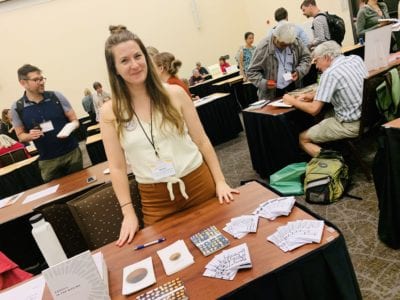Thanks to Tova Fleming for sitting down and talking about my poetry book and scholarly work! You can read more about our conversation here.

By admin in articles, Books, conferences
Thanks to Tova Fleming for sitting down and talking about my poetry book and scholarly work! You can read more about our conversation here.

By admin in articles Tags: cold war, ginsberg, new nuclear criticism
My article, “Addressing the Atomic Specter: Ginsberg’s ‘Plutonian Ode’ and America’s Nuclear Unconscious” is now available to read in Symplokē 27.1-2 (2019).
“The poem, prophetic in its moment of writing, anticipated the larger social movement in which it would participate and addresses what I will call America’s nuclear unconscious. In the years following, during the peak of antinuclear protests in the United States, Ginsberg continued to revise and perform the poem. However, when the antinuclear protests of the late 1970s began to separate the issues of nuclear disarmament and power plant decommissioning, despite their many linked environmental, social, and political consequences, Ginsberg’s poem tried to hold them together.2 Composed at the edge of cold war détente, “Plutonian Ode” articulates what would soon be subsumed under Reagan-era escalation by figuratively drawing together nuclear weapons, waste, energy, and raw materials—forms of the nuclear that had been disarticulated in service of proliferation and what cultural historian Joseph Masco calls America’s “radioactive nation-building project” (2006). It is the repression of the relations between nuclear forms that forms America’s nuclear unconscious. And it is the work of the poem to manifest the contradictions that structure this enduring site and condition.”
Read the full article here.
By admin in articles
My article, Atomic Afrofuturism and Amiri Baraka’s Compulsive Futures, is now available in the special issue of Oxford Literary Review: EXT: Writing Extinction (41.1).
You can read the manuscript version on Academia.edu, or contact me for the published version if you do not have access to OLR.
Abstract:
In 1984, the same year that scholars were gathering at Cornell University to theorise ‘Nuclear Criticism,’ Amiri Baraka was formulating his own version of nuclear futurity in Primitive World: An Anti-Nuclear Jazz Musical. Baraka’s musical manifests and conceptualises atomic afrofuturism, a historically specific affirmation of black existence that was forged while facing nuclear apocalypse. Nuclear Criticism, which lost much of its exigency after the end of the Cold War, needs to evolve to account for the present nuclear era, as its focus on totalities leaves it ill-equipped for incorporating the disparate lived experiences of those who have already experienced the apocalypse and for whom nuclear apocalypse is a repetition or extension of white supremacy’s agenda of extinction. This article offers a genealogy of atomic afrofuturism, examining how throughout the cold war period African American artists like Sun Ra, Langston Hughes and Amiri Baraka were exploring the post-apocalyptic conditions of black existence, including its conflicting temporalities and tenses, while much of America still believed the apocalypse was imminent, not immanent. And so it is Derrida’s anti-apocalyptic missives together with Baraka’s anti-nuclear musical that can offer the framework Nuclear Criticism so desperately desires for imagining the unimaginable.